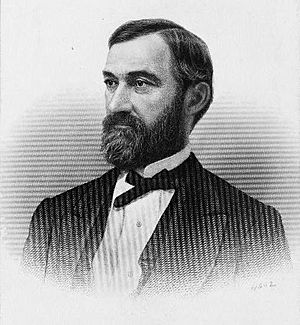DeWitt Clinton Littlejohn facts for kids
Quick facts for kids
DeWitt Clinton Littlejohn
|
|
|---|---|

DeWitt Clinton Littlejohn
|
|
| Born | February 7, 1818 Bridgewater, New York |
| Died | October 27, 1892 (aged 74) Oswego, New York |
| Place of burial |
Riverside Cemetery, Oswego, New York
|
| Allegiance | United States of America Union |
| Service/ |
United States Army Union Army |
| Rank | |
| Battles/wars | American Civil War |
DeWitt Clinton Littlejohn (born February 7, 1818 – died October 27, 1892) was an important figure in American history. He was a high-ranking officer in the Union Army during the American Civil War. He also served as a Representative for New York in the U.S. Congress.
Contents
Early Life and Career
DeWitt Clinton Littlejohn was born in Bridgewater, New York. He went to Geneva Academy but decided not to finish college. Instead, he started several successful businesses. For a while, he helped move fresh produce on lakes and canals. Later, he became involved in making flour in Oswego, New York.
Political Career in New York
Littlejohn was very active in politics in New York State. He served as the Mayor of Oswego in 1849 and 1850. He was also a member of the New York State Assembly many times. This is like being a state representative. He served in the Assembly in 1853, 1854, 1855, 1857, 1859, 1860, 1861, 1866, 1867, 1870, 1871, and 1884.
He was chosen as the Speaker of the New York State Assembly five times. This is a very important leadership role. He was Speaker in 1855, 1857, 1859, 1860, and 1861.
Service During the Civil War
When the American Civil War began in 1861, Littlejohn worked hard to help. He recruited soldiers in the Oswego area. In July 1862, he became a Colonel in the 110th New York Volunteer Infantry. He helped raise this group of soldiers himself.
He trained his troops near Baltimore, Maryland. Later, his regiment was sent to New Orleans, Louisiana.
Serving in Congress
While still in the army, Littlejohn decided to run for the United States House of Representatives. He won the election as a Republican. He resigned from the army on February 3, 1863. He then served in Congress from March 4, 1863, to March 3, 1865.
During his time in Congress, he led the Committee on Revolutionary Pensions. This committee handled matters related to pensions for soldiers from earlier wars. He did not run for re-election in 1864.
After the war, on February 26, 1867, President Andrew Johnson honored Littlejohn. He was given the special military rank of brevet brigadier general of volunteers. This rank was effective from March 13, 1865.
Later Life and Business
After his time in Congress, Littlejohn moved to Buffalo, New York. But he returned to Oswego in 1867. He wanted to help Oswego grow by connecting it to a major port by rail.
In 1868, he started and became president of the New York and Oswego Midland Railroad. This railroad traveled across much of New York State to New York City. He also created a steamboat service. This service connected Long Island to his new railroad.
In 1870, the Republican party wanted Littlejohn to run for Lieutenant Governor of New York. However, he chose not to run for that position.
Later, Littlejohn changed his political views. In 1872, he joined the Liberal Republican Party. He supported Horace Greeley for president that year. He then became a Democrat. He was a delegate to several Democratic state meetings. He was also an ally of Samuel J. Tilden, another important politician.
DeWitt Clinton Littlejohn passed away in Oswego. He was buried at the Riverside Cemetery.
 | Madam C. J. Walker |
 | Janet Emerson Bashen |
 | Annie Turnbo Malone |
 | Maggie L. Walker |

